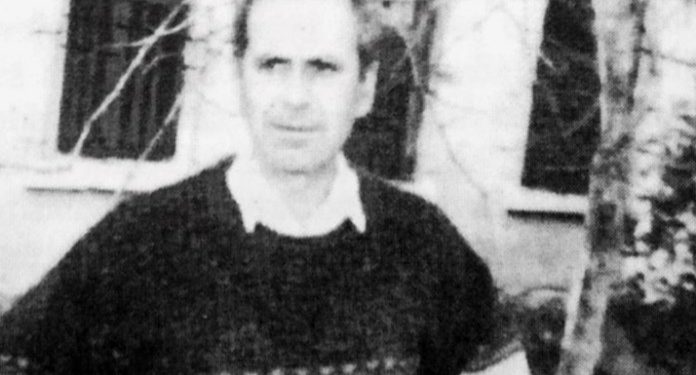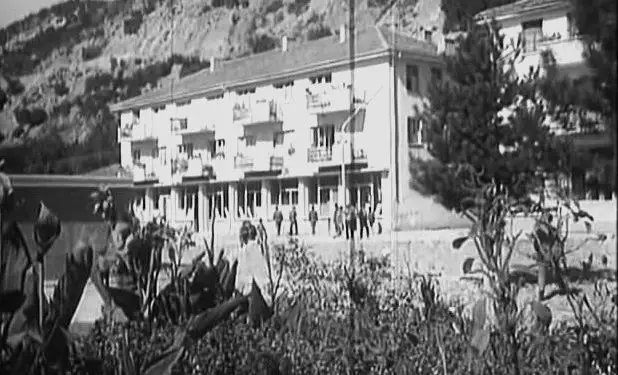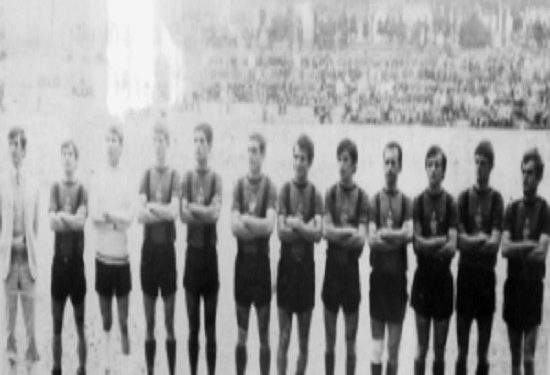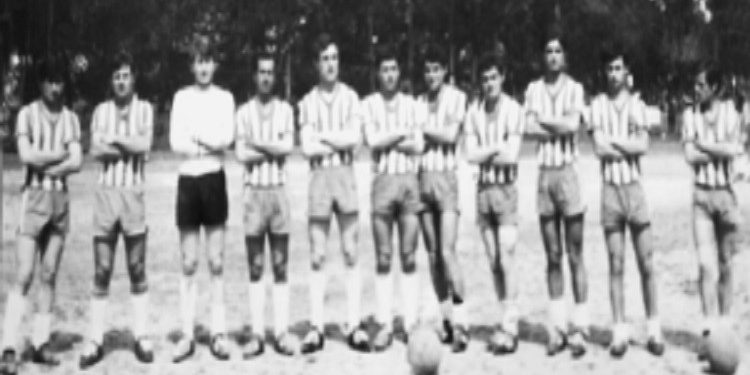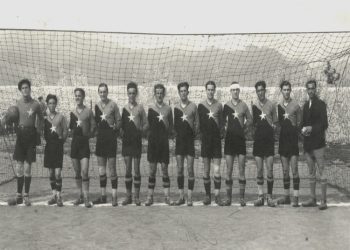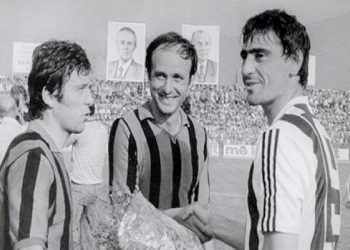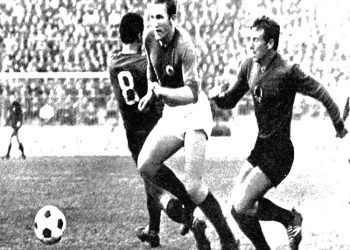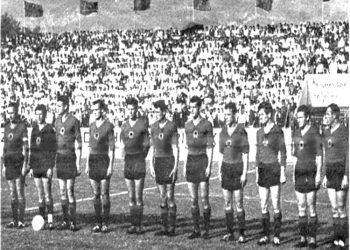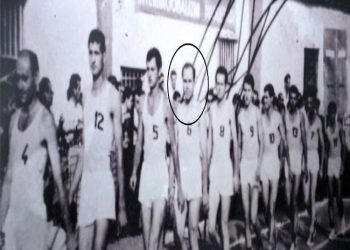By Ilir J. Hoxha
Memorie.al / Football in Skrapar was a typical case of the perfect symbiosis of local footballers with those from Japan. In the football history of the “September 5” team (as that team was known before the 90s), the contribution of newcomers has been important, but no less important, it has also been the other way around, where “5 September” has been a school for their growth. Football players; Paulin Ndoja, Gëzim Kasmi, Myfit Kurti, Neim Guri, Fatmir Mersini, Mehmet Xhafa, Petrit Brahja, Hazis Çeço, etc., etc., except that they would raise the football of “September 5” professionally, but they would they made an excellent advertisement, making it known in the football environment of the time. Sabri’s case is a mix of this phenomenon, as he would be and feel more “local”, even though he was Beratas.
Apart from his talent, what made him special was that, unlike other Jabanxhi, Sabriu did not come to the city of Çorovoda with a suitcase in hand, but to be a citizen of this city and the city rewarded him, making him “First Citizen” . The City Council, in complete anonymity, awarded the talented former footballer of the 70s, the “Citizen of Honor” Medal.
Talent, grit and simplicity make him one of the most outstanding footballers, not only of “September 5”, but also beyond. The “reactionary”, with his football, in a very busy country, managed to change the opinion about the reactionaries.
Although he was not “allowed” to be good, he, with his simplicity and talent, managed to make a city for himself and soften the militancy of the local leaders of that time. A universal player, who played all positions, defender, organizer, excellent striker. Defender and at the same time one of the scorers of the head of the “September 5” team.
In the dialectic of conflicts of opposites, kindness, desire, sympathy, grudge, jealousy, competition, etc., etc., like never before, it never happened to me that the sum of all these opposites was as unique as this one, for the outstanding Beratas and Skraparas football player, Sabri Dylin.
It is an absolute opinion that classifies him in the ranking of the best footballers over the years. The story and life of the soccer player Skraparo-Beratas, Sabri Dyli, would be one of those that could rarely be found, in a second case. The handicap would exceed itself, because then when the 6-year-old minor, even though he would have a partisan father (Çeta “Halim Xhelo”), an uncle who had been with the “National Front”, and wealth up to the lower limits of the “Gulag” , would cause his village Dronovic, to clear his biography, to remove him from his hometown.
It would be one of those lucky cases of internment, because it would result in “rising”! “Degdisja” to Berat, would also be helped by the indifference of the government at that time, which was busy with the problems of the time, such as that of providing bread.
With the savings and the income they received from the sale of cattle, Sabri’s father would build a house in one of the peripheral neighborhoods of Berat. Thus, in 1951, the Dyli family would find themselves citizens of Berat. Life would continue in the normality of a hard-working and well-to-do family. The lack of information about football, it’s not that he would have any feelings for any of the football idols, local or foreign, in any case, this would not prevent him from dreaming. He would be present in the activations of the alleys of the stone city, with a unique “schedule”, from the end of school until the dark evenings.
Passionate to the point of “madness”, with the ball and football, the “declassed” citizen, along with his height, would also start to grow as a football player. It is said that a talent needs 99% work, but I don’t believe that this was valid, even for Sabri Dylin! He would get his first pleasure from football sometime from the age of 12, when he would be declared champion in the neighborhood championship, where one of the first of the reeds of the “Gorricë” neighborhood would be Sabri Dyli himself.
This would serve as an incentive and CV for the future footballer, and it would not be long before the first offer came. An older friend from the neighborhood, after talking with the youth coach of “Tomori”, would make the first “official” offer, inviting him to be part of the youth team of that team.
– “For me it was a marked event, not only would I play, but I would get a uniform and that was not a little for that time. There have been many cases since the lack of uniforms, many talented footballers have been burned…” – the former “Tomori” defender begins the conversation. He would start his football adventure, in 1958, at the age of 14, when, from the first test, the first coach Ibrahim Hoxha, would recognize in Sabriu the qualities of a talented football player.
In the arms of Valentin Karaj, Novruz Hados, Fatbardh Buzi, Andon Zahos, etc., the footballers who would write the history of “Tomori” Football Club, he was younger in age, but not in quality. Gathering with young people would increase him faster, while “releasing” the aforementioned constellation of footballers from the youth team would highlight his character and professional qualities more.
16 years old, he would be a definitive part of the youth lineup, but he would also be present in the adult control matches, which took place on Thursdays. In 1960, in a friendly match with “Flamurtar” from Vlora, the outstanding coach of Berata, Thanas Jançe, would give him his first test as a “gentleman” with the adults, where he would play a brilliant second half.
However, this was no accident. “Employed”, full-time, would continue to be part of the youth team, but the desire looked high. The next satisfaction would come, when he would be the youth champion of “Tomorri”, in the final meeting of Category II, “Apollonia” – “Tomorri” 0 – 2, but he would be the protagonist of that victory , would step on the carpet of the “Qemal Stafa” National Stadium for the first time.
The years passed slowly, while Sabri Dyli walked at a different pace. The year 1962 and the friendly meeting “Tomori” – “Vllaznia” would make the final separation as a “part-time” footballer with the adults, because coach Jançe would call him “under the gun”, with the big team and by his side notables of the time; Astrit Ziu, Ajet Hoxha, Flamur Kullari, etc.
With the “mantle” of the football player of “Tomori”, he would join the gathering on the mountain of “Dajti”. The activations were no longer “news”, because Dyli, with his excellent performances, had become an idol of the fans, and undoubtedly the simplicity also increased the “stakes”, to be such. In the history of football, the archives, statistics and legends speak of one of the best “Tomors”, that of the years ’63-’67, where Sabri Dyli was an indisputable part.
Like never before, together with Dyli, in 1964, the team of “Tomor” would go to the final of the Cup of Albania, with “Partizan” of Panajot Panos. Only a short time later, in Tirana, for the championship, “Tomori” would get an important draw against “Partizan” and Sabri Dyli would shine, surprising the famous commentator, Andon Mazreku, who in a fair lecture I’m quoting:
“Tomori” is a nice team. He is not at home today. He wants to get revenge on ‘Partizan’, after losing the final 3-0 in Tirana’ for the Cup of Albania. A nimble, energetic lad who has completely blocked the attack from the left is catching my eye. It is Sabri Dyli, an elegant footballer, who after stealing the ball from the attackers, becomes the spark of the attack from the wing…”!
– Regarding this, Sabri Dyli remembers: “It was more than a challenge, I was small to take on such a task and even smaller, Panayoti’s greatness made me even smaller. The big ‘partisan’, the full stadium, the fame of Panos, so much that they filled my being with fear, as well as with faith and optimism. I was aware that before these advantages, I had nothing to lose, I remember that Panayoti was very simple and kind, this gave me the courage to be focused and why not, I say that I did that task well, even why Panajoti was exceptional” – the former Berata defender would say about that meeting, which would put him on the list of coveted footballers.
His appearance had exceeded all expectations and now Sabri Dyli was one of the well-known footballers, not only in Berat, but beyond. Talent, character, simplicity, grit and seriousness, would make S. Dyl well-known and the idol of Berata fans. October 1966 would prove fatal for the rising star.
Then when everything was talking only about the successes of Sabri Dylin, somewhere, the fame of a “reactionary”, got jealous and with a surprising “blow”, he would interrupt the career of a talented football player at his peak. Beyond any logic, the “fellows of the party” would not allow a declassified person to rob you of the fame of “successes” and would destroy everything in the career of a football player, whose only “fault” was an uncle. his, had been outclassed.
Without any cause, without any reason, they would bring him back as a family to where they came from. Wonders have no limit, when the party removed him from the village as outclassed, Berat would already exile him, with the same motivation, taking him to Dronovic…! His exclusion from the sport would confuse an entire city, which had a “duty” to be silent and had to express their displeasure, only under their breath with whispers in cafes.
Regarding this, Dyli says that: “I communicated the decision to storekeeper Vanjua, as he was full of tears and pain, he would tell me before I undressed for training; – Sabri, don’t undress, I’ve been ordered to hand over your clothes. – I didn’t understand what was happening, especially since Vangjo and I used to joke a lot, but it wasn’t acting…! It was true. I wouldn’t play football anymore…! It wasn’t enough for me, but Vangjo’s pain also killed me a lot, anyway, I had to give myself courage”, says Sabriu immersed in those deep memories of the past five decades.
– “For the sake of the truth, I later learned that the cause was the poor performance in the meeting, ‘Tomori’-‘Vllaznia’ 0:1, which we played at the aviation field in Kučovo. I remember that a mistake with goalkeeper Karaj, which I don’t think was my fault, cost us the only goal of the match. Anyway, I would believe this, if coach Jançe would communicate to me in the analysis of the match. I’m sure that my exception was written a long time ago, because if this was the case, how did they know that I would appear poorly…!
I was contacted the next day and we started immediately. Even if I had scored 5 goals, it would still be a “mistake”, which would be worth being deported. We have moved as a family to Dronovic. They were difficult moments, but they required strength to overcome. The blow was coming from all sides, I saw that even people were afraid to talk to me, while I was a soldier in Starovë, I was immediately transferred to Genio, in Sopot in Librazhd”, says Dyli, the Berata football legend.
A frightening attempt by the famous coach, Sabri Peqini, who at that time was training “Labinot” of Elbasan, would give him hope, but…. nobody dared. The outclassed should receive the deserved punishment…! Released from the army in April 1968, they would find him in the village of his birth, trying to find a livelihood. The spring of this year would give him hope, that not everything was closed. One of his acquaintances, Rakip Kërri, a fan of “September 5”, would report to the team’s “manager”, “friend” Hekuran Hajdini, that the footballer was free.
They would immediately bring the news and Sabriu would leave for Skrapar, in June 1968. The news had arrived faster than Sabriu in Çorrovoda and there he would be under the surprising hospitality of an entire people, who would have to leave “principles of partisanship”, to respect a “reactionary”, so good! All the structures were standing and Dyli would forgive all the vicissitudes of life in front of this hospitality.
“I came to Çorovoda for the second time – says Sabriu. – I was somewhere from September of 1966, when I was a soldier in Starovo and the department where I served in the army, came to play a friendly with the team of “September 5” that came out with the result; 1 – 1. To be honest, I didn’t have any feeling that time, because you have to understand that I came and went in a flash, that I had to go to training with the team. The hospitality put me in front of the responsibility, what I would have to give beyond myself, to justify that assessment. The ‘first secretary’, as we used to say to Hekuran Hajdini, would be next to me, and I’m organized so well and quickly, that I can’t find words.
It was lucky for “September 5”, but more so for us Jabanjis, who had such a great person. He was a football lover, a very positive, fair and powerful person…! He went everywhere to do good…! In Çorovoda, we football players were public figures, and we had an interest from the top leaders of the district. When I was setting up with Hekuran Hajdini, to brag, he took me to a senior manager, Demir Nuellari. He had heard about me and expected me to be a big body and when he introduced me, Hekurani said: – ‘If you were Sabri Dyli, I thought you were a colossus, if you were really small’?!
Like everywhere, but especially in Skrapar, everything was related to football and I had this luck, to be a part of football. They did me many honors, they gave me a house, which was not a little, job categories, etc., etc. I went to Çorovodë at that time when Skrapari was just starting to become a factor in second category football. The activation of Gëzim Kasmi, Paulin Ndoja, in the beginning, and then the footballers Xhafa, Brahja, Mersini, etc., was a big “bonus” for the football of this city.
We were a solid team, where the combination of local footballers with those from abroad was naturalized in a harmonious way. From Skrapar, I have experienced both sides of the coin, that of immense pleasure, but also the opposite, but I don’t know that there is any football player who played football in Skrapar and does not have the best impressions of his life. his. We were so appreciated, that I cannot express it…” – Sabri Dyli would conclude.
The arrival of Sabri Dyli would give a different pace to the development of football, not because they had not given it or that the other Jabanxhi did, but because Sabriu, his quality and simplicity, easily merged with the local fans. In the years 1970-73, we had a group of local and foreign footballers in the team, very talented, like this; F. Hasko, M. Baze, R. Idërshaj, M. Xhafa, H. Ibro, A. Korçari, A. Qafa, G. Sulçe, H. Koprêncka, F. Mersini, P. Brahja, M. Bregu, etc. , could play in any team of the first category.
“The opportunity has given me the chance to experience many football emotions, but the meetings with the super ‘Shkëndina’ of Vasillaq Zëri, Agron Bulku, Petri Gjon. Milto Gurmës, Agron Sula, etc., etc., from the years 1970-71, it is hard to forget them. We were tied 0:0 in Çorovodë and 1:1 in Tirana, not only in the result but in all components.
Maybe we could have been among the few teams that have made a dignified resistance to ‘Skëndisa’. Just like the derbies have their burdens, they were difficult for us, but we took the hand of the little “brother” Poliçan, even though he was a “Partizan” B, in the composition. Beginning of the ’71-’72 championship, we would find a ‘guest’ in our house in Poliçan, more than the reversal of the result, as it is said now, 1-2 and the result (1:0; 1:2), what I can’t get it out of my mind, it was the extraordinary support of our fans, who came by car and on foot, from 30 km. away, to support us.
The victory gave us the ‘status’ of ‘heroes’ in an extraordinary reception in Çorovoda. This championship found us at the head of the classification, but not before ‘Naftëtari’, leading Kuçova and ‘Skëndisa’. After one year, 1972-73, we would give this “resto” to “Tomori” in a stadium full of locals, but none the less they were from “ours”. We were very fit and confident. The 4:4 draw was more than deserved.
For the dignified performance, as rarely seen in Berat, we received the applause of the Berat public. I remember when the Korčar referee Fidai Pupa congratulated us at the end of the match and would tell us – ‘I thought like Skrapar’ you would be beaten 4:0, but you played very well. Bravo to you! In the second phase in Skrapar, the meeting was even more beautiful, because “Tomor” needed the victory. As luck would have it, I punished the ‘Tomor’ team with a goal kick that would relieve the nerves of goalkeeper Shefa. Again 1:1…”, Dyli remembers those times and defining matches!
The vicissitudes for Sabriu would have “calculated” a second series, as just like in the first persecution, he would be hit here too, when he was at the peak of his career and success, when everything in Çorovoda was connected and trembled around Dyl. the fatal blow would come for the career and life of the football coach. The internal clans of the chiefs and pariahs of the district, as well as personal clashes, to make it more believable, you had to color the planned strike with a little declasse.
“Klan” had calculated that; in order to achieve his personal goal, he had to attack a “declassified hostile group”, where a “reactionary” should definitely be a part of this group. The violation of 4,150 Lek, when other colleagues had committed this violation with 10,000 or 15,000 Lek, with food coupons, they would choose only Sabri as the violator. Age has given me the opportunity to witness that horror.
Although I didn’t understand then what was being talked about, the “guillotine” was more terrible than the execution on the woodpile. The “traitors” should be made an example and in a “parade” in front of a “stadium”, people should be unmasked…! It was one of those cases that scared everyone. I can’t understand now, that silence of the First Secretary, of the Chairman of the Committee… even today, it remains an unsolved puzzle…?! He would be punished by the absurd, 1 year in prison, where the liberal judge, Refat Aliaj, gave him extraordinary help. Bulqiza, would be the next “team”, the fame of the footballer, had also gone to its galleries.
“The prison is a prison and there is no good, but the prisoners did what they could – says Sabriu, – but there I saw a prisoner sentenced to three years, because he had imitated one of the leaders of the time (Kadri Hazbiun), and that seemed to me ‘calmed down’ a bit. It was worse – I said”, Sabriu remembers his prison sentence.
At the end of 1974, he would return to Skrapar again, where he would find the same respect and appreciation from the simple people of Skrapar, but not only. Although already separated from football for more than a year, his talent would make him equal in the team, where he would contribute for several more years with the team, as a football player and as a coach of the “5 Shtatori” team. .
Sabri Dyli, in the memories of his former football teammates and scrappers
Mehmet Xhafa: “Football life forgives you and gives you a lot of satisfaction, but for me, being trained, playing next to such a high personality, like Sabri Dyli, was a fate that gave me strength and impetus for my further career.. .”!
Fatmir Mersini: “A coach who did not put pressure on the players, did not create a group, was direct, was harmonious with the group, but above all, an excellent person.
Avdyl Korçari: “There is no question that Sabri Dyli is one of the best footballers of all time. He was a universal player, as good as he was as a defender, he was so good as an organizer and even more so he was an excellent striker and scorer. He commanded respect not only as a good man, but also as an excellent professional. I’m an old friend of Sabrina, but with all the vicissitudes that he went through, how did that man not vent once!? An extraordinary man. Thank you Sabri Dyli, for everything you have given for us”.
Aurora Ajdini (USA): Thank you for bringing back these football legends, who carry very beautiful memories and emotions. In our city, Sunday after lunch was filled with men and women heading to the field to follow “September 5”, our favorite team. The road to the dormitory was also our “stand”, of women, as emaciated as anywhere in other cities of Albania. Sabri Dyli, the best, who together with others brought us together to spend a different Sunday in our city”. Memorie.al




